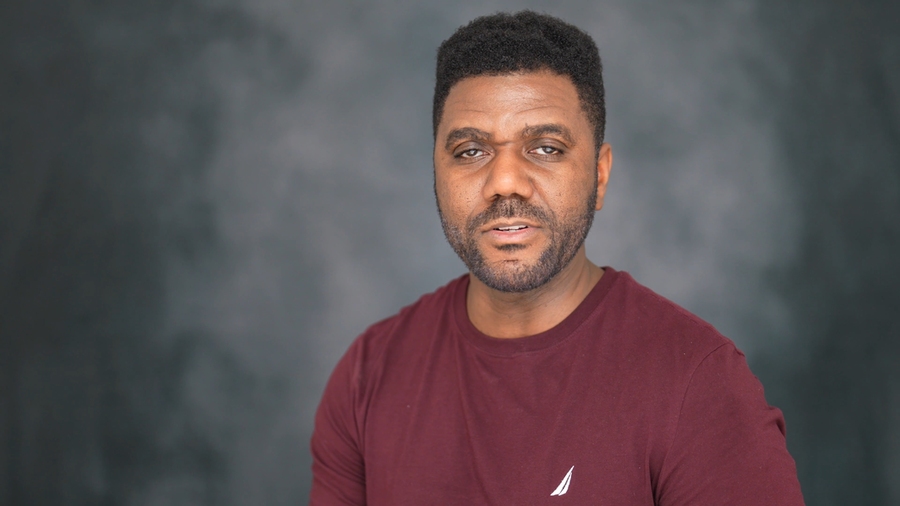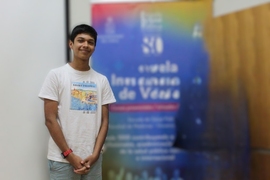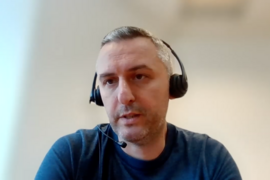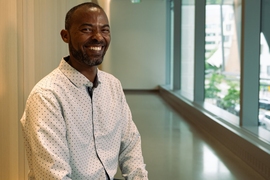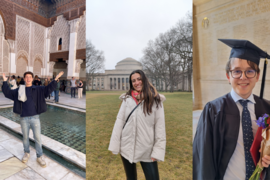Mlen-Too Wesley has faded memories of his early childhood in Liberia, but the sharpest one has shaped his life.
Wesley was 4 years old when he and his family boarded a military airplane to flee the West African nation. At the time, the country was embroiled in a 14-year civil war that killed approximately 200,000 people, displaced about 750,000, and starved countless more. When Wesley’s grandmother told him he would enjoy a meal during his flight, Wesley knew his fortune had changed. Yet, his first instinct was to offer his food to the people he left behind.
“I made a decision right then to come back,” Wesley says. “Even as I grew older and spent more time in the United States, I knew I wanted to contribute to Liberia’s future.”
Today, the 38-year-old is committed to empowering Liberians through economic growth. Wesley looked to the MITx MicroMasters program in Data, Economics, and Design of Policy (DEDP) to achieve that goal. He examined issues such as micro-lending, state capture, and investment in health care in courses such as Foundations of Development Policy, Good Economics for Hard Times, and The Challenges of Global Poverty. Through case studies and research, Wesley discovered that economic incentives can encourage desired behaviors, curb corruption, and empower people.
“I couldn’t connect the dots”
Liberia is marred by corruption. According to Transparency International’s Corruptions Perception Index for 2023, Liberia scored 25 out of 100, with zero signifying the highest level of corruption. Yet, Wesley grew tired of textbooks and undergraduate professors saying that the status of Liberia and other African nations could be blamed entirely on corruption. Even worse, these sources gave Wesley the impression that nothing could be done to improve his native country. The sentiment frustrated him, he says.
“It struck me as flippant to attribute the challenges faced by billions of people to backward behaviors,” says Wesley. “There are several forces, internal and external, that have contributed to Liberia’s condition. If we really examine them, explore why things happened, and define the change we want, we can plot a way forward to a more prosperous future.”
Driven to examine the economic, political, and social dynamics shaping his homeland and to fulfill his childhood promise, Wesley moved back to Africa in 2013. Over the next 10 years, he merged his interests in entrepreneurship, software development, and economics to better Liberia. He designed a forestry management platform that preserves Liberia’s natural resources, built an online queue for government hospitals to triage patients more effectively, and engineered data visualization tools to support renewable energy initiatives. Yet, to create the impact Wesley wanted, he needed to do more than collect data. He had to analyze and act on it in meaningful ways.
“I couldn’t connect the dots on why things are the way they are,” Wesley says.
“It wasn't just an academic experience for me”
Wesley knew he needed to dive deeper into data science, and looked to the MicroMasters in DEDP program to help him connect the dots. Established in 2017 by the Abdul Latif Jameel Poverty Action Lab (J-PAL) and MIT Open Learning, the MicroMasters in DEDP program is based on the Nobel Prize-winning work of MIT faculty members Esther Duflo, the Abdul Latif Jameel Professor of Poverty Alleviation and Development Economics, and Abhijit Banerjee, the Ford Foundation International Professor of Economics. Duflo and Banerjee’s research provided an entirely new approach to designing, implementing, and evaluating antipoverty initiatives throughout the world.
The MicroMasters in DEDP program provided the framework Wesley had sought nearly 20 years ago as an undergraduate student. He learned about novel economic incentives that stymied corruption and promoted education.
“It wasn't just an academic experience for me,” Wesley says. “The classes gave me the tools and the frameworks to analyze my own personal experiences.”
Wesley initially stumbled with the quantitative coursework. Having a demanding career, taking extension courses at another university, and being several years removed from college calculus courses took a toll on him. He had to retake some classes, especially Data Analysis for Social Scientists, several times before he could pass the proctored exam. His persistence paid off. Wesley earned his MicroMasters in DEDP credential in June 2023 and was also admitted into the MIT DEDP master’s program.
“The class twisted my brain in so many different ways,” Wesley says. “The fourth time taking Data Analysis, I began to understand it. I appreciate that MIT did not care that I did poorly on my first try. They cared that over time I understood the material.”
The program’s rigorous mathematics and statistics classes sparked in Wesley a passion for artificial intelligence, especially machine learning and natural language processing. Both provide more powerful ways to extract and interpret data, and Wesley has a special interest in mining qualitative sources for information. He plans to use these tools to compare national development plans over time and among different countries to determine if policymakers are recycling the same words and goals.
Once Wesley earns his master’s degree, he plans to return to Liberia and focus on international development. In the future, he hopes to lead a data-focused organization committed to improving the lives of people in Liberia and the United States.
“Thanks to MIT, I have the knowledge and tools to tackle real-world challenges that traditional economic models often overlook,” Wesley says.
